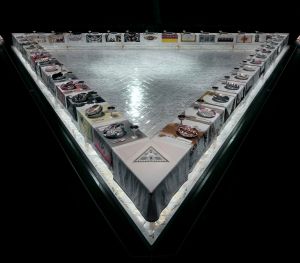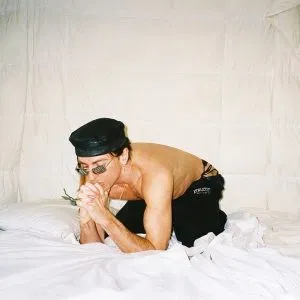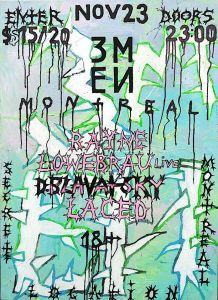You released “Stretch“, your first single as a solo artist a week ago. Listening to it, I can pretty plainly see why you called it that, but the title also reminded me of [jazz trumpeter/composer] Christian Scott aTunde.
Yeah. Stretch music.
Exactly. His thing is that “stretch music” is a bit of a mission statement. He’s very deliberate about what ‘stretch’ means to him, and I was wondering if you yourself were deliberate about how you morph genres, or if it’s more of a ‘go-with-the-flow’ kind of thing.
[My songwriting] always starts with a bass riff or a drum beat, and I kind of build up based on how I’m feeling at the moment. But always in the back of my mind, there’s that sense of like, “I don’t wanna make another RnB song, or another funk song.” I’m not deliberately trying to push a genre, but I definitely don’t want to be repeating stuff that’s been happening. Another thing with Christian Scott is he’s really trying to take his roots and his family’s heritage and make it into his own [sound], morphing it with hip hop and stuff. Most of my music, at least on this first album, is about self-reflection, taking my past and putting it out front. I actually saw him live in New Orleans, where he’s from. Just the way he carries himself is also very inspirational to me.
Speaking of self-reflection, as I was listening to your bass work, some obvious influences came to mind: Bootsy Collins, Pino Palladino. What other musicians influence you?
Pino Palladino is probably my greatest influence right now. His son Rocco Palladino as well. James Jamerson. Scott Lafaro. You ever heard of him? He’s a jazz bassist but I just really like his motific work and his basslines.
I have a bit of a more left-field question. When I was thinking about people wearing their influences on their sleeve, I also thought about how a lot of artists pull from places you wouldn’t expect, like how Dave Chappelle said one of his biggest influences was Bugs Bunny. Do you have anything similar? Something outside the realm of music that influences the way you play?
I’m really into film. I really enjoy how you can completely change a feeling just by color, tone. When I’m making music I try to think about how every little tone is gonna be created. Wong Kar-wai is probably one of my favourite directors right now—I don’t understand Chinese, so it’s very hard to follow without subtitles—but his use of color is really interesting.
Is there gonna be a full Cyrus Jordan EP?
I have like, nine songs that are almost done. They’re all varying in genre, not sticking to one thing. The music’s changed based on where I’m at in my life. They’ve all been made in the last, like, year. I’m debating how to release them, whether I should do two EPs or a full-length album. If I do a whole album, I already have a name: “Red Room.” There’s a red room by my apartment that I look at when I’m on my balcony and it’s like I’m in the room, reflecting on myself.
Let’s pivot to your other projects. Most people will recognize you as the bassist for Artemis. Is there a difference in mindset between how you approach your band stuff and your solo stuff?
Absolutely. It’s always different collaborating with someone rather than sitting in your room playing into a computer. Like, when you’re writing an Artemis tune, she’s the center of the universe, right? And that’s okay, that’s why I’m there! She’ll sing something and basically it’s my job, or Ben’s job, or Isaiah’s job to play something that makes her shine as the singer. Whereas for me, singing and being the frontman has definitely been pushing my boundaries a lot. For me the music comes first, then the vocals come later. It’s way more relaxed than when you’re like, “Oh, you gotta build something around this one idea.” We have like a four track EP done for Artemis almost.
Artemis talked in her Pink Things interview about how a lot of the Vancouver music kids have formed a “musical family” in Montreal. I think of you guys as kind of a rubix cube—just a couple shifts and turns and you have a new project with some of the same people, or a new pattern with the same colours. Do you guys think of yourselves almost as a Montreal indie version of the Soulquarians?
Yeah, we’re definitely a musical family. The Soulquarians? That might be a bit of a goal, but it’s cool sharing everything with everyone. I feel like my project and Artemis’ project have been the product of people from Schwey and Winona Forever coming together. I’ve been listening to them since I was in high school, so being able to work and hang out with them and call them my family is a really big honour.
Have you found a lot of people outside that circle? Obviously Montreal has a really bustling indie music scene, ranging from guys doing punk rock house concerts to people studying jazz and doing contemporary RnB stuff. Have you found it easy to find that level of musical chemistry elsewhere?
Music students or ordinary people playing music?
Both, really. People at Concordia, people that aren’t.
When you think about music, you can think about it in two ways, and I feel like this is personally where I run into problems playing music with people. If anyone from jazz school is listening, you’re gonna scoff at me, but whatever—I think of music as more like, energy. Playing music with someone, whether it’s a jazz gig or you’re jamming with someone at the cypher, you’re putting out your energy and they’re feeding off it and vice versa. It’s always an exchange of energy. Whether you study music or you just picked up a guitar, if you wanna jam, I’ll jam with you, I don’t care. If you have that ‘feeling’, I will want to play music with you. It’s just a matter of being there and not getting stuck in your own ego. Ego is everything, and lack of ego is very important. Finding connections with people is just getting down to how you’re actually feeling and how you want to present yourself in the musical universe.
I feel like when you go to a place like McGill or Concordia where people get ground down by routine and they’re not studying music even if what they really wanna do is music, there’s a part of them that thinks “Music is a gig, I have to be a brand, I have to sell myself.” Is that [mindset] a problem you run into at school or the greater Montreal music scene?
I think we’ve all at some point gotten caught up with how we’re gonna make money doing this, or how we’re gonna rise above everyone else who’s doing music, because really, anyone can do music. To quote [Schwey backup vocalist] Jarah Dobbs: “Music is easy!” My roommate who has never done any music before picked up a computer and just started making house music last night. So it’s important to think about making yourself a brand and treating your music like a business, but [only] to a certain extent, right? You don’t want to be that guy that shows up to a gig before the rest of the band, stresses out, and gets mad at his band for not showing up ‘on time’. It’s gonna make you sound like a bunch of robots. As for music school, they don’t teach us anything about that, at least not at Concordia. They don’t even have a music business course. I think that’s what’s lacking in music education, not learning how to promote yourself. You leave music school and you’re like, “Oh yeah I don’t know what to do with all my skills. I know how to play really good music but why am I not gigging?”
You can tear up the Real Book but when it comes to making bank…
Yeah, exactly. When it comes to promoting yourself in the music scene, just be genuine and go to shows and talk to people. Play music with whoever you want. Drop the prejudices. If someone asks you to play a country gig, play the country gig! Country music’s fire.
Put that on a shirt! Since we’ve delved into all the admittedly not-so-fun aspects of probably the funnest job in the world: have you ever given much thought to the state of the music business? We just talked about how your roommate started making house music last night, and I was talking with a friend recently about the pros and cons of bedroom pop. The pro being that anybody who wants to make music has that outlet. They can download a DAW, sample some YouTube video, pick up a shitty guitar and boom, they’ve got a lofi beat or something. The con is you run into a lot of music that’s run-of-the-mill, and you yourself said earlier with “Stretch” that you didn’t want to write just another RnB or funk song. Does that kind of market saturation—combined with the BS about how Spotify pays you like, 10 cents for every 1000 plays—ever get to you? [Editor’s note: Spotify actually pays around 3 dollars for every 1000 plays. Wowza!]
It definitely weighs on my mind, but I’m gonna be doing this whether I make money or not. I’ve yet to reach a thousand listens on my songs, which means I’m gonna get nothing from it, but I don’t really care. Like, the saturation of the music industry was, I think, inevitable. People are gonna post their music on the Internet until the end of the Internet, it’s not gonna change. I don’t think it’s gonna really inhibit—I don’t wanna say ‘the real musicians’, because everyone’s a musician; your breathing is music—but if your music is meant to be heard by the world, then it will be heard by the world. If you simply wanted to make music and put it out there on Bandcamp or it gets 400 listens on Spotify in your entire life, that’s just the way the universe intended it to be. If your music doesn’t click with people, then it doesn’t click with people, but as long as it clicks with you, that’s what matters.
Let’s end it with a breezier question. You know Mononeon, right?
Yeah, I met him at Pop Montreal. Him, JD Beck, and DOMI Keys. They were at the Jon Bap show.
That’s insane, man. Did you get to talk to him for a bit?
I didn’t actually realize it was Mononeon.
Really? I thought he’d be the most recognizable dude ever.
He was very recognizable but I was spaced out, I had just gotten off work. He was chilling with my buddy Zach and Zach was like, “Hey, this is so-and-so”—I forget his real name—and I was like, “Hey man, nice to meet you,” and I walked away and was like, “Oh wait, that was Mononeon.”
I asked because I was wondering if you knew about his art manifestoes, these rules that he lives by. Paraphasing here, but stuff like “Live with Color” or “Play Music Every Day.” Is there a Cyrus Jordan version of that manifesto?
I’m not sure this is gonna stay my manifesto but right now, if you ask anyone close to me, it’s honesty. Be true to yourself and be true to others, because if you’re not true to yourself, then you’re fake. The worst thing to do in life is not to be honest with yourself. If you live your life pretending to be someone else, you’re never gonna go anywhere. I think sea animals are really cool in the way that they’re constantly moving and changing and evolving. Stay true to yourself and if you’re not quite vibing with the same people anymore, just be honest with them, man. Say something. If you’re making a certain kind of music and you’re not vibing with it anymore, don’t be afraid to change it. Kid Lucifer did it. Les Soniques, they changed up. Schwey’s changing up. As living beings we’re constantly changing, and if you’re honest with yourself about that, it’ll make things a breeze and it’ll make life so much better.
What changes have you made? Whatever you can tell Graphite.
Here’s the inside scoop, Graphite: I’m just trying to take care of myself better. I’m trying to get up at 8:30 every day. Obviously I didn’t do that today.
That’s okay, man. People change all the time.
Exactly. Don’t beat yourself up if you don’t follow your rules. I try not to beat myself up. Like, “Oh, I didn’t work on music the other day.” I’m working on loving myself for who I am. That’s part of what “Red Room” is about.







